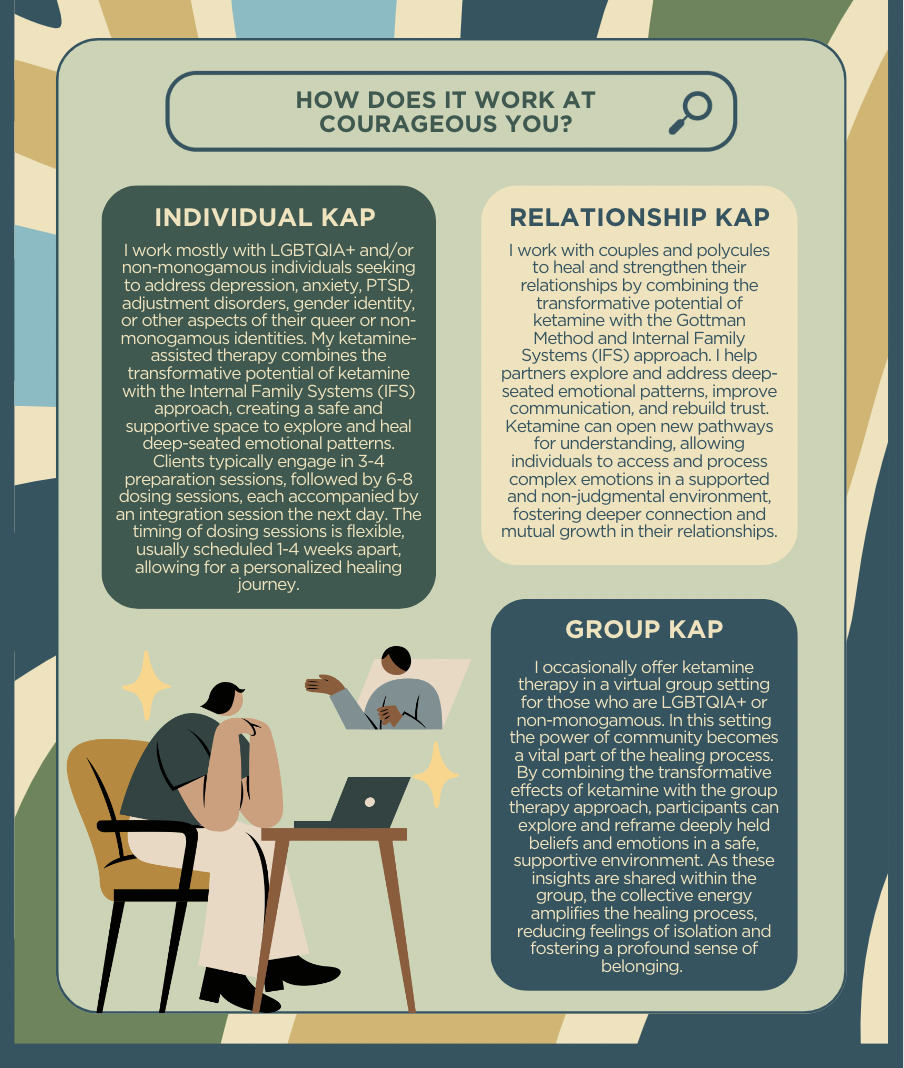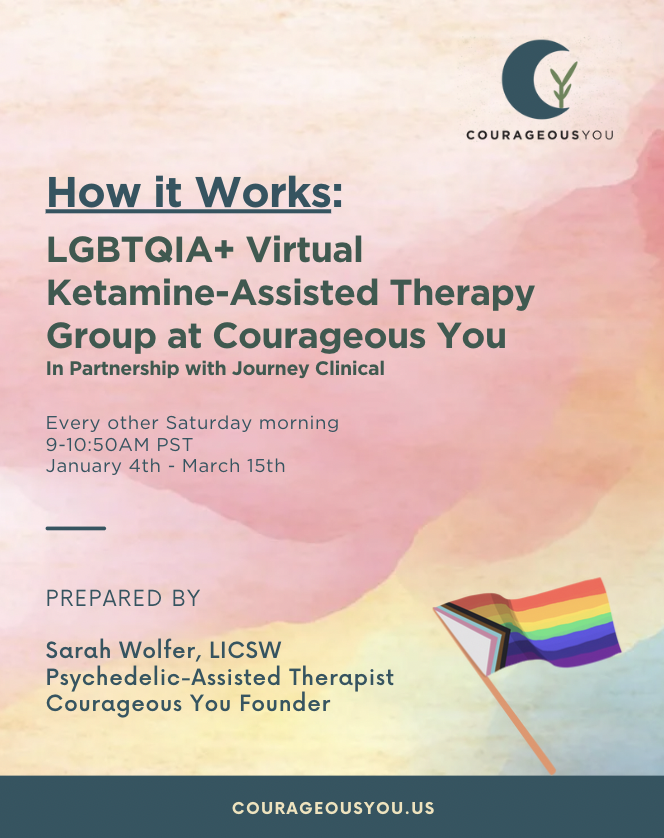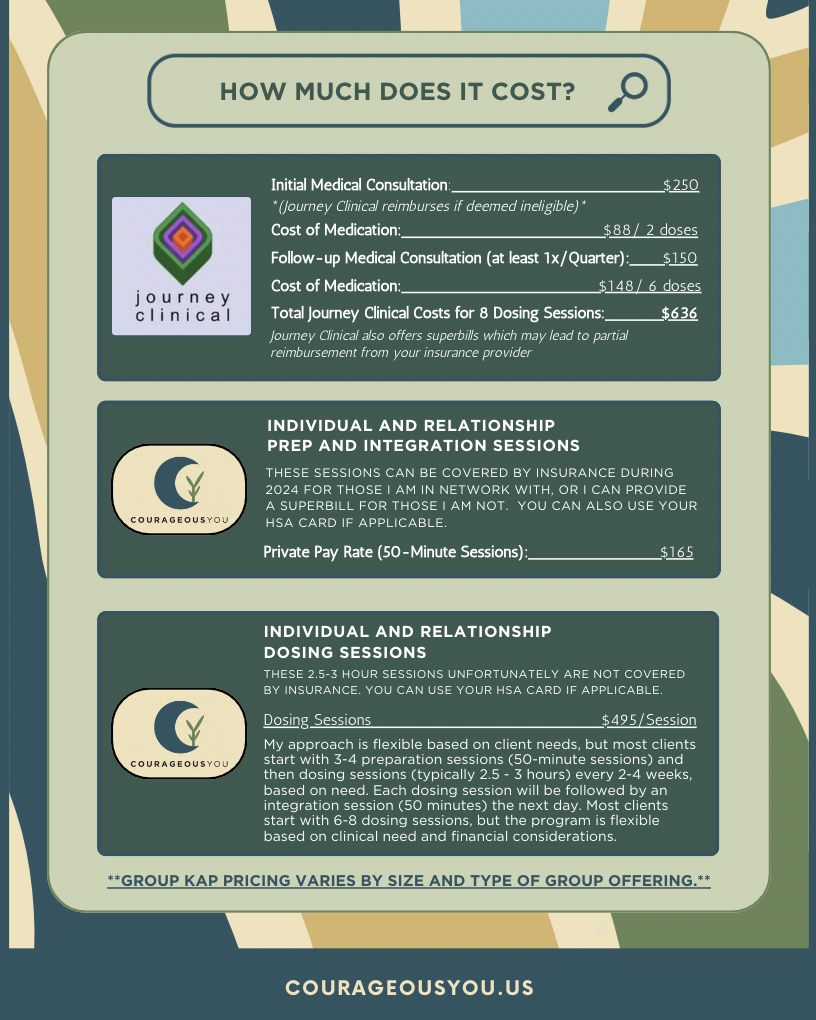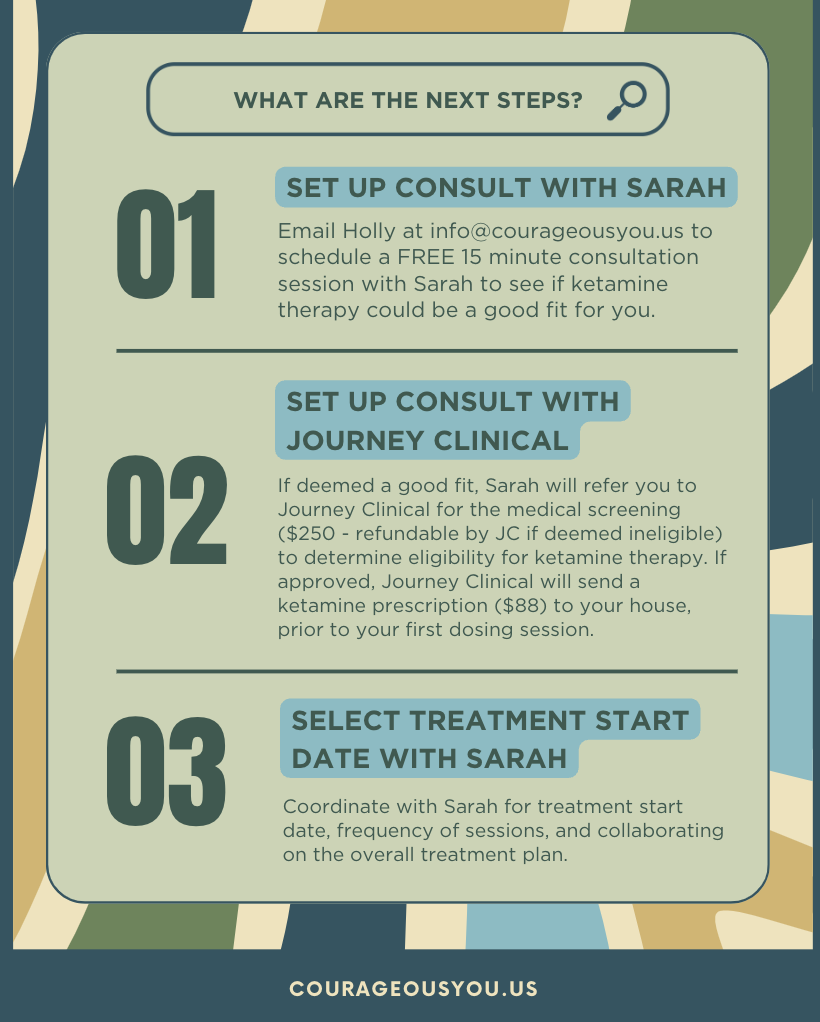You might be curious how all this works. Check out this comprehensive list of FAQs on everything related to Ketamine-Assisted Therapy at my practice.

“The queer experience is unique, and our traumas, ways of being, and ways of supporting each other are often little understood by those outside the community. We are the best equipped to care for one another.” – Dijnn Thompson
What is Ketamine?
Ketamine is a legal, safe, and effective treatment for mental health conditions such as depression, anxiety, and PTSD when used under the guidance of clinicians. Its antidepressant and mood-enhancing effects are rapid, often beginning within 1-2 hours after treatment. Ketamine works by blocking NMDA receptors in the brain and indirectly stimulating AMPA receptors, which helps form new synaptic connections and strengthens neural circuits that regulate stress and mood. This action enhances overall neuroplasticity, leading to lasting improvements in symptoms. Ketamine can be administered in various ways, including IV infusion, intramuscular injection, intranasal spray, and sublingual lozenges. In my work with Journey Clinical, we exclusively use the sublingual lozenge form. This involves dissolving a small tablet in your mouth, swishing it for 12 minutes, and then spitting it out. If eligible for the program, a doctor at Journey Clinical will prescribe the medication, which will be sent to your home by a compounding pharmacy.
How does Ketamine Feel?
The effects of ketamine, which most patients find pleasant, last for approximately 45 minutes. These effects can make you feel “far from” your body, and facilitate shifts in perception that can often feel expansive in nature. Your motor and verbal abilities will be reduced, so you’ll be lying down in a comfortable position during the experience. Once these effects subsided, we’ll spend the remainder of our appointment giving you space to process and discuss your experience. While it may feel hard to articulate what happened during the experience, patients feel like the insights gained are none-the-less clear. Studies have shown that the benefits to mood and neurological growth can last up to two weeks after the Ketamine experience.
How Does Ketamine-Assisted Psychotherapy Work at your Practice?

I provide ketamine assisted therapy to individuals, couples, and polycules, and I occasionally offer KAP in a group setting as well. My approach is flexible based on client needs, but most clients start with 3-4 preparation sessions (50-minute sessions) and then dosing sessions (typically 2.5 – 3 hours) every 1-4 weeks, based on need. Each dosing session will be followed by an integration session (50 minutes) the next day.
**All sessions are held via telehealth from the comfort of your own home.**
I take on the psychotherapy portion of the experience, while Journey Clinical’s medical team supports you on all medical aspects. This includes determining eligibility, developing a custom treatment plan, prescribing the medicine and monitoring outcomes.
I currently have one upcoming virtual ketamine-assisted therapy group scheduled for those who identify as part of the LGBTQIA+ community in WA state. This will take place starting in January 2025 and there are limited spots available to keep the space as safe as possible.
To discuss all your KAP options, you can schedule a free consult with me, Sarah, by email at info@courageousyou.us!

Do you Offer Ketamine-Assisted Therapy Groups?
I occasionally offer ketamine therapy in a virtual group setting for queer and/or non-monogamous humans. Currently, I am gearing up to offer a LGBTQIA+ Ketamine-Assisted Therapy Group from January 4th – March 15th. The group will take place from 9-10:50AM PST on Saturday mornings throughout that time period. You can find out more information and reserve your spot in the group HERE.
What does a KAP Medicine Session Look Like With You?
A typical KAP medicine session is approximately 2.5-3 hours long. You will prepare your space at your home to be most comfortable for you and we will talk about how to best prepare your space during our preparation sessions. You will also need a safe and trusted companion to be at home throughout the duration of your session in the event you need something. We will check in, do some intention-setting and ritually create the container for your medicine work. When you are ready to proceed, you will self-administer your ketamine dose. Per ISHA Health guidelines, we will be doing sublingual ketamine, which means you will will hold the ketamine in your mouth for approximately 12 minutes and then spit the medicine out. I am here to support you with grounding and often offer readings or music during your sublingual dosing period. Most people begin to feel the effects of the medicine after about 15 minutes, and experience a period of about 45-60 minutes where they “go inside” themselves while resting. I have several music playlists that I will share with you in advance that you can use for your KAP sessions and I recommend having eye-shades (I will send some to you in advance of your first dosing session) which you can use to support your internal work. I am with you virtually during your entire experience and provide non-directive support and reassurance, as well as making sure that you are having a safe experience. Following the period of active medicine effects, people usually spend about an hour in quiet reflection and discussion about their experience. We will have a follow-up integration session the following day.
Can I do my KAP treatment in-person?
With me, all aspects of KAP treatment are provided via telehealth only. I have chosen this method as I have found in my work, that by providing KAP treatment in-home, it removes barriers for a lot of clients. For example, if we were to do KAP treatment in an office setting, clients would need to have someone drive them home and it would be a more lengthy process. I also value the importance of set and setting in the KAP process, and most often, clients feel safest and most ready to journey inward, from the comfort of their own home. That said, there are other KAP providers who do offer in-person treatment if you feel that would be the best method for you.
What Conditions Does Ketamine Treatment Work Best For?
Ketamine has a demonstrated efficacy in treating depression, particularly treatment- resistant depression and suicidal ideation. Ketamine has also been shown to alleviate symptoms of chronic anxiety and PTSD. There has been emerging research that suggests Ketamine can also help those experiencing addiction, bipolar disorder and obsessive-compulsive disorder.
Why is Ketamine Treatment Beneficial?
While research into ketamine treatment is still ongoing (see below for some links to full- text research), it is understood that it works on a neurotransmitter called Glutamate (known as our “brain fertilizer”), which leads to the production of an important growth factor that helps the brain repair damaged neurons affected by stress and mental illness. This creates a neuroplastic window after a ketamine treatment, which people can use to shift internal patterns and behaviors/relational dynamics that maybe previously felt much more stuck. Ketamine treatment can improve mood within hours/ days and cause the regeneration of nerve cells over time. I talk with clients about the idea of “seizing the neuroplastic window” after a KAP treatment because the shifts one makes during that neurplastic window will help the brain/body establish new, more adaptive patterns that are more likely to stick.
Can I do only preparation and/or integration sessions with you?
Yes, you can! Reach out for a free consult and we can discuss your specific needs.
Why is Ketamine Therapy beneficial for LGBTQIA+ humans?
In LGBTQ communities, incidents of depression, anxiety, and addiction are far higher than in the larger population, mainly due to the damage that heterocentric and ciscentric environments cause. The world we live in, unfortunately wasn’t created for us, and this has been shown to slowly shape and impact queer and trans lives by altering how we view the world, interpret the response of others, and hold a sense of our own safety in both meaningful relationships and new situations. Psychedelics can be a powerful way to heal much of this as well as an avenue to explore and even reconstruct gender and sexual identities—helping people to embrace and affirm who they really are. If a person has been fighting their sexual identity, the neuroplastic window of opportunity is a critical period for them to shift to a new way of understanding themselves and relating to other people in their lives. Though psychedelics are proven to help queer folx, it is important to have a safe space where you can be free to explore all parts of your identity. This way you don’t have to worry about someone using the wrong pronouns or name during treatment, or someone judging you for how you do relationships differently, and you can feel confident that your therapist just “gets it” and you don’t have to educate them on the identities most important to you. All of this is why having a queer psychedelic-assisted therapist is beneficial for many who are a part of the LGBTQIA+ community and why I am passionate about working with these clients.
Why is Ketamine Therapy beneficial for those who are non-monogamous?
There are three primary struggles that impact humans along their non-monagamous journeys, per the research of Justin Natoli (you can read more in “Queering Psychedelics”). These are shame, past trauma, and difficulty transcending labels. Shame is one of the most insidious blocks to accessing self love, and psychedelic work has been shown to help clients transform that shame they may be experiencing from religious and cultural institutions, familial upbringing, and societal expectations into greater self-love and acceptance of the ways we love differently than that of the mainstream. Another common struggle when sharing love freely is that it can bring up trauma from childhood and past relationships of all types, and psychedelic therapy is especially suited to help clients dive deeper into this realm, and do the healing work necessary to engage in the types of relationships we most desire. Psychedelic therapy has been shown to help clients build secure attachment which impacts how we show up in all our important relationships, including the one with ourself. Finally, psychedelic therapy, can help us transcend the labels that can bind our relationships and help us see the full complexity and potential of our relationships, outside of the boxes we may put ourselves in. Non-monogamy isn’t easy, and neither are any relationship structures…. but “to remove the barriers that prevent us from fully participating in love’s abundance, we must face our shame, resolve past traumas, and surrender to love without labels” – Justin Natoli. Luckily you are not alone, and KAP treatment can help guide you down this transformative path.
Do you work with people who do not identify as part of the LGBTQIA+ or non-monogamous communities?
Yes I do! Though my clients usually fall into one or both of these categories, I do also work with clients who want to work with me for a variety of other reasons, including being neurodivergent, having extensive trauma histories they would like to work through, navigating relationship challenges, those who are also therapists in the field, and more. Schedule a free consult to see if we would be a good fit to work with each other!
Is Ketamine Addictive?
While research into this question is still ongoing, there does not appear to be any evidence that ketamine is physiologically addictive. But for folks with certain risk factors, ketamine can become intensely psychologically addictive. Those risk factors include: recreational ketamine use/abuse in club/rave scenes, and concurrent use/ abuse of other substances (e.g. alcohol, cocaine, MDMA). Because ketamine is a dissociative, it can be quite psychologically addictive to some people who are struggling with remaining in their current realities, and becomes a means of escape. Another risk factor appears to be intranasal use of ketamine, rather than sublingual, oral, intramuscular or intravenous routes of administration. Extreme ketamine abuse (e.g. daily use of high amounts) can lead to bladder complications and total bladder removal, or to accidental death due to impairment while attempting to bathe, drive or move around while under the effects of ketamine. There is currently no evidence to show a risk of addiction in Ketamine-Assisted Psychotherapy models, where clients are carefully evaluated by both their KAP therapist and psychiatrist to determine any risk before proceeding, the amounts prescribed are limited, and where a client’s experience and interaction with the substance is closely monitored by their therapist. People who have a history of ketamine abuse would likely not be eligible for KAP. However, if you have any concerns about your personal risk levels regarding addiction to ketamine, we can discuss that thoroughly before deciding whether to proceed with KAP.
How Much Does It Cost?

Medical intake and follow ups with Journey Clinical as well as the dosing sessions with me are mostly not covered by insurance, but they are eligible for out of network reimbursement. Here’s a breakdown of the expected costs of treatment.
Journey Clinical’s Costs:
— Initial Medical Consultation with Journey Clinical: $250
— Medication: $88 (2 sessions)
— Total: $338
— Follow-up Medical Consultation with Journey Clinical: $150 (at least 1x per quarter)
— Medication: $148 (6 sessions)
— Total: $298
Total Estimated Journey Clinical Costs for 8 Dosing Sessions: $636
Ketamine-Assisted Therapy Costs: My hourly rate is $165.
Preparations and integration sessions are 50 minutes and are covered by insurance for the remainder of 2024 if I am paneled with your insurance carrier. You can reach out to Holly at info@courageousyou.us to see if I am paneled with your insurance carrier. Dosing sessions are not covered by insurance and are 2.5-3 hours ($495).
If you are interested in ketamine treatment and this is not financially accessible for you, please reach out. I reserve slots specifically for the psychotherapy portion of ketamine treatment, depending on availability.
I also occasionally offer group KAP sessions to ensure greater accessibility. We can discuss your specific needs on a free consultation call. Please reach out to discuss all options.
Will my insurance plan cover KAP Treatment?
Mostly, it will not. Journey Clinical medical services are out-of-pocket but they can offer superbills for you to submit to your insurance provider for potential partial reimbursement.
Our 50 minute preparation and integration sessions will mostly be covered by your insurance plan in 2024, if it’s a plan that I’m paneled with (please email Holly at info@courageousyou.us to check if I am paneled with your insurance plan). I can also offer superbills for your preparation and integration sessions which you can submit to your insurance provider for potential partial reimbursement. I also can accept HSA cards and do payment plans to make this more financially feasible for you.
I am unable to bill insurance at this time for your KAP medicine sessions. My hourly rate is $165 per 50-minute session. My dosing session cost is $495.
Can I use my HSA card for KAP treatment?
Yes you can!
What is Journey Clinical?
Journey Clinical is a platform for licensed psychotherapists to incorporate science-based psychedelic therapies in their practice safely and effectively, starting with Ketamine-Assisted Psychotherapy (KAP). Journey Clinical’s in-house medical team takes on patient eligibility, prescriptions and outcome monitoring, while I take on the therapy. Their collaborative care model is designed to deliver personalized treatment plans to meet your individual needs and improve long-term outcomes.
How Long Does KAP Treatment Take?
I provide ketamine assisted therapy to individuals, couples, and polycules, and I occasionally offer KAP in a group setting as well. My approach is flexible based on client needs, but most clients start with 2-4 preparation sessions (50-minute sessions) and then dosing sessions (typically 2.5 hours) every 1-4 weeks, based on need. Each dosing session will be followed by an integration session (50 minutes) the next day. Most clients start with 6-8 dosing sessions, but the program is flexible based on clinical need and financial considerations.
Are there any Contraindications for KAP Treatment?
This will be explored with the Journey Clinical medical team, but KAP is not recommended for folks who are actively experiencing psychosis or mania/hypomania, as it can exacerbate these symptoms. If you have high blood pressure or cardiac/ pulmonary issues, you may need to get medical clearance (through management of these conditions) before engaging in KAP. You will not need to taper off antidepressant medication before undergoing KAP, but benzodiazepines should be avoided on the day of your medicine session.
What about Power and Ethics?
Though the vast majority of psychedelic practitioners operate ethically, unfortunately there have also been numerous cases of abuses of power, boundary violations, and outright emotional/physical/sexual violence committed by therapists in the psychedelic space. The mental health field that I operate in also has a long history of pathologizing and oppressing BIPOC, LGBTQI+, female-identified, poor, currently or previously incarcerated, and disabled people. No one who is coming to therapy to heal from the pain and suffering of trauma and mental health issues should ever be made to feel unsafe by the very person that they hope will help them. It is a tremendous responsibility to sit with someone in a vulnerable non-ordinary state of consciousness. I take that responsibility seriously, and want to make sure that our work together feels consensual, safe and ethical. We will be openly discussing my role as your therapist and the boundaries that I operate within, as well as any concerns you have about working together.
Where can I find Research on Ketamine Treatment?
For further exploration, below are links to full-text research articles about Ketamine:
2019 – Ketamine Assisted Psychotherapy (KAP): Patient Demographics, Clinical Data and Outcomes in Three Large Practices Administering Ketamine with Psychotherapy 2018 – Opioid Receptor Antagonism Attenuates Antidepressant Effects of Ketamine
2020 – The role of dissociation in ketamine’s antidepressant effects
2021 – Ketamine—50 years in use: from anesthesia to rapid antidepressant effects and neurobiological mechanisms
2021 – Ketamine therapy swiftly reduces depression and suicidal thoughts
2021 – An Integrative Approach to Ketamine Therapy May Enhance Multiple Dimensions of Efficacy: Improving Therapeutic Outcomes With Treatment Resistant Depression
2021 – Repurposing Ketamine in Depression and Related Disorders: Can This Enigmatic Drug Achieve Success?
2021 – Therapeutic Potentials of Ketamine and Esketamine in Obsessive–Compulsive Disorder (OCD), Substance Use Disorders (SUD) and Eating Disorders (ED): A Review of the Current Literature
2022 – Toward Synergies of Ketamine and Psychotherapy
2022 – Ketamine treatment for depression: a review
2022 – At-home, sublingual ketamine telehealth is a safe and effective treatment for moderate to severe anxiety and depression: Findings from a large, prospective, open- label effectiveness trial
2022 – Active mechanisms of ketamine-assisted psychotherapy: A systematic review
2022- Lower-dose psycholytic therapy – A neglected approach
2022 – [ABSTRACT] Ketamine-Assisted Group Psychotherapy for Frontline Healthcare Workers with COVID-19-Related Burnout and PTSD: A Case Series of Effectiveness/Safety for 10 Participants

